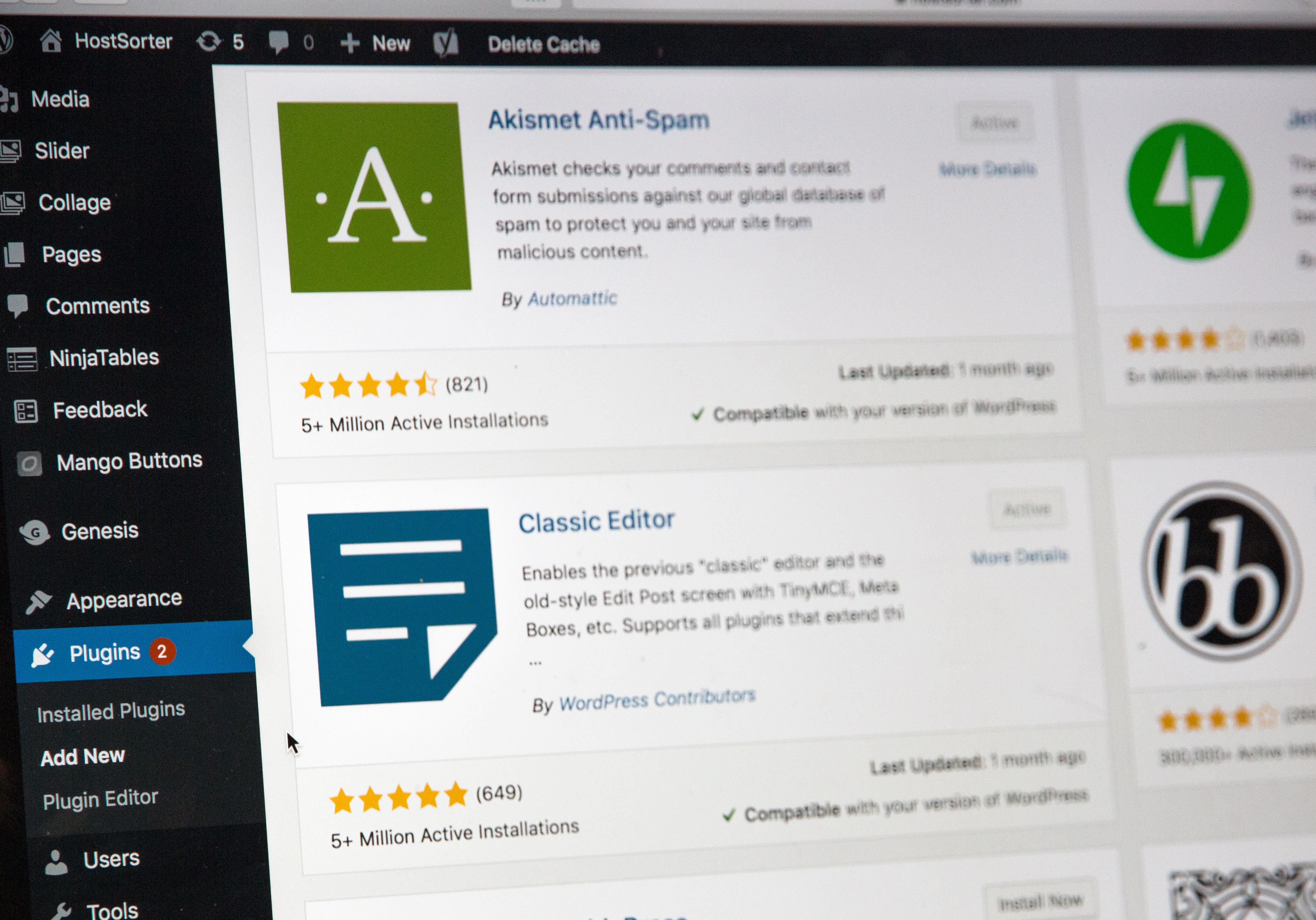HubSpot Websites Vs WordPress Websites - What Business Owners Need To Know!
by Charlotte Thornton on 18-Apr-2022 10:00:00

HubSpot CMS and WordPress are excellent platforms for creating business websites. They are both adaptable, easy-to-use, and don’t require vast coding knowledge. What’s more, they are both perfect blogging platforms, with inbuilt tools to support better search engine visibility and integrate with your digital marketing efforts. Here is what business owners need to know when making a choice between WordPress and HubSpot.
Content Management Systems (CMS)
What HubSpot and WordPress have in common is they are both content management systems (CMS). A CMS is an integrated online publishing platform that covers all the tools required to build websites, including core pages, landing pages, and blogs, as well as contact forms, analytics widgets, graphic optimisation tools, video hosting etc.
In contrast to ‘traditional’ website development, which involved building websites from raw code in HTML, CSS, JavaScript and other programming languages, WordPress and HubSpot are designed to be easy-to-use for people without a development background. A CMS also includes (in principle at least) all the tools you need within the system itself, so you don’t have to juggle lots of third-party code editors, image manipulation, web hosting, and SEO tools to build your business website. Some platforms – and WordPress is famous for this – also have an active developer community with a selection of third-party plug-ins and mods to enhance performance.
A CMS can be used to create a variety of websites, from simple brochure sites to e-commerce shops and everything in between.
Using WordPress with HubSpot
Both WordPress and HubSpot CMS are good options if you want to get a good functional website online quickly without dealing with coding from scratch. Additionally, HubSpot can be used with WordPress by integrating a WordPress website with HubSpot CRM, so it isn’t a black-and-white choice, but there are several important differences between the two CMS platforms. Let’s look at the advantages and disadvantages of each, but bear in mind that an ‘advantage’ of WordPress doesn’t make it a ‘disadvantage’ of HubSpot, and vice versa.
WordPress – advantages
- A tested and reliable platform since 2003 – in 2021 there were over 450 million WordPress powered websites online across the world. (In comparison, there are just under 91,000 active websites built using HubSpot CMS).
- Extensive theme customisation options, with millions of professionally developed themes available that can be tailored to your site.
- SEO tools – WordPress has developed in tandem with Google search algorithms for nearly 20 years, so its Yoast SEO toolset is one of the best available for an open-source CMS. Yoast is highly customisable and requires some investment in time to learn but is effective at improving online visibility. Yoast can be used in tandem with HubSpot Marketing Hub for improved results.
- Websites can be built for free using WordPress.org.
- WordPress makes it easy for businesses to publish and edit blog posts ‘under one roof’ on the main business website URL – in fact, WordPress was originally developed as a blogging platform and is still one of the best in the world.
WordPress – disadvantages
- The functions of WordPress are spread over many different plug-ins, often developed by third parties. As WordPress is an open-source platform, there is no unified quality guarantee that applies to all plug-ins, so some may be incompatible with each other or even crash your website.
- WordPress is subject to frequent updates, and although these strengthen the platform and make it more secure overall, it may create incompatibilities with certain themes and plug-ins.
- Plugins require constant maintenance and security upgrades, if these are not kept up to date they pose extreme security risks.
- Wordpress sites are often easy targets for hackers due to the vulnerably and exposure out of date plugins create.
- Slower average page loading speed than HubSpot websites.
- WordPress does not offer hosting – you will need to arrange this through a hosting provider.
HubSpot CMS – advantages
- SEO integration –HubSpot CMS has a wide range of powerful SEO tools that help you optimise your site as you build it, and this potential is increased should you invest in HubSpot Marketing Hub.
- HubSpot CMS websites use a unified database that places all the data you need to customise the user experience in one place.
- Integrated landing page builder and blogging tools let you create unlimited (depending on your package) keyword or service-specific pages to expand the reach of your site and integrate with your advertising campaigns.
- Inbuilt analytics help you keep track of your content performance, identifying your most successful keywords, and your most popular blog posts and webpages – and also content that isn’t working so well. This lets you optimise your website for better search results and lead generation.
- Provide personalised calls to action to guide a prospect through the stages of their buyer journey – customised by the website visitor’s device, location or any other data point stored in your CRM.
- Provide gated incentive content through discrete pop-up windows to encourage email newsletter signups.
- Drag and drop editor requiring no coding knowledge to create beautiful and functional designs
- Very fast page load speeds thanks to the CDN network, good for user experience as well as SEO
HubSpot CMS – disadvantages
- Your website must be built using HubSpot if you want to host it on the HubSpot CMS servers.
- As a SAAS product, there are limitations to modifying or editing the underlying code of your website, however developers are able to access advanced customisation features using the database options.
- HubSpot CMS is a paid service available as a ‘basic’ Professional tier and a more feature-rich Enterprise package, which can be expensive.
- Limited compatibility with third party databases/CRMs, which may be a problem if you already have a large amount of data organised in a specific way.
Find out more
As HubSpot Certified Diamond Partners, and web developers with extensive experience working with WordPress websites, we can help you make an informed decision about the best CMS to support your online sales and marketing objectives. To find out more, please call JDR today on 01332 982197.
Image Source: Unsplash
- Inbound Marketing (SEO, PPC, Social Media, Video) (832)
- Strategy (368)
- Sales & CRM (197)
- Marketing Automation & Email Marketing (192)
- Business Growth (168)
- Website Design (162)
- Hubspot (141)
- Lead Generation (117)
- Google Adwords (100)
- Content Marketing (94)
- Conversion (53)
- Case Studies (49)
- News (47)
- Ecommerce (39)
- Webinars (36)
- SEO (27)
- AI (21)
- Events (19)
- LinkedIn Advertising (17)
- Video (17)
- Video Selling (15)
- Software training (13)
- Niche business marketing (11)
- The Digital Prosperity Podcast (10)
- Facebook Advertising (8)
- HubSpot Case Studies (7)
- Web Design Case Studies (1)
- February 2026 (9)
- January 2026 (12)
- December 2025 (15)
- November 2025 (6)
- October 2025 (17)
- September 2025 (16)
- August 2025 (14)
- July 2025 (14)
- June 2025 (5)
- May 2025 (19)
- April 2025 (15)
- March 2025 (13)
- February 2025 (13)
- January 2025 (8)
- December 2024 (2)
- November 2024 (4)
- October 2024 (21)
- September 2024 (4)
- August 2024 (8)
- July 2024 (14)
- June 2024 (16)
- May 2024 (25)
- April 2024 (15)
- March 2024 (18)
- February 2024 (5)
- January 2024 (10)
- December 2023 (6)
- November 2023 (10)
- October 2023 (13)
- September 2023 (12)
- August 2023 (14)
- July 2023 (13)
- June 2023 (14)
- May 2023 (15)
- April 2023 (13)
- March 2023 (14)
- February 2023 (13)
- January 2023 (15)
- December 2022 (13)
- November 2022 (6)
- October 2022 (8)
- September 2022 (22)
- August 2022 (15)
- July 2022 (13)
- June 2022 (16)
- May 2022 (14)
- April 2022 (16)
- March 2022 (17)
- February 2022 (11)
- January 2022 (8)
- December 2021 (6)
- November 2021 (7)
- October 2021 (11)
- September 2021 (10)
- August 2021 (7)
- July 2021 (7)
- June 2021 (4)
- May 2021 (4)
- April 2021 (1)
- March 2021 (3)
- February 2021 (5)
- January 2021 (4)
- December 2020 (7)
- November 2020 (6)
- October 2020 (5)
- September 2020 (9)
- August 2020 (18)
- July 2020 (17)
- June 2020 (17)
- May 2020 (10)
- April 2020 (21)
- March 2020 (24)
- February 2020 (21)
- January 2020 (12)
- December 2019 (23)
- November 2019 (12)
- October 2019 (14)
- September 2019 (16)
- August 2019 (15)
- July 2019 (13)
- June 2019 (6)
- May 2019 (8)
- April 2019 (4)
- March 2019 (2)
- February 2019 (2)
- January 2019 (2)
- December 2018 (3)
- November 2018 (24)
- September 2018 (11)
- August 2018 (9)
- June 2018 (3)
- May 2018 (6)
- April 2018 (14)
- March 2018 (12)
- February 2018 (16)
- January 2018 (15)
- December 2017 (15)
- November 2017 (18)
- October 2017 (23)
- September 2017 (19)
- August 2017 (28)
- July 2017 (27)
- June 2017 (25)
- May 2017 (18)
- April 2017 (17)
- March 2017 (16)
- February 2017 (17)
- January 2017 (14)
- December 2016 (21)
- November 2016 (27)
- October 2016 (25)
- September 2016 (16)
- August 2016 (20)
- July 2016 (19)
- June 2016 (14)
- May 2016 (20)
- April 2016 (24)
- March 2016 (22)
- February 2016 (28)
- January 2016 (27)
- December 2015 (28)
- November 2015 (19)
- October 2015 (9)
- September 2015 (12)
- August 2015 (5)
- July 2015 (1)
- June 2015 (10)
- May 2015 (3)
- April 2015 (11)
- March 2015 (14)
- February 2015 (15)
- January 2015 (12)
- December 2014 (2)
- November 2014 (23)
- October 2014 (2)
- September 2014 (2)
- August 2014 (2)
- July 2014 (2)
- June 2014 (7)
- May 2014 (14)
- April 2014 (14)
- March 2014 (7)
- February 2014 (2)
- January 2014 (7)
- December 2013 (9)
- November 2013 (14)
- October 2013 (17)
- September 2013 (3)
- August 2013 (6)
- July 2013 (8)
- June 2013 (4)
- May 2013 (3)
- April 2013 (6)
- March 2013 (6)
- February 2013 (7)
- January 2013 (5)
- December 2012 (3)
- November 2012 (2)
- September 2012 (1)
Subscribe by email
You May Also Like
These Related Blogs

Will A Website Really Benefit Your Business?
I would like to begin with these 6 facts: In 1953 the first colour television was introduced. In 1969, 16 years later, the first man landed on the moo …

Where Do I Start With Social Media? A UK Business Owner’s Guide
Most businesses use social media as part of their online marketing plan and it is very easy to feel like you have been left behind when you are not us …

Benefits Of Blogging: 7 Reasons For Business Owners To Blog
Blogging is a marketing strategy that we hear a lot about - many businesses are using it to great effect. However there are still many businesses who …




